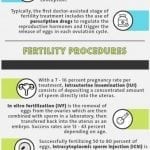Fertility issues are common in both men and women, and the stress they cause is often damaging. Understanding how infertility and treatment works helps families find confidence.
The desire to have a baby is overwhelming for many couples, and it’s devastating when month after month no baby is conceived. The first few times your pregnancy test is negative can be sad, but you know it often takes a few months for some women to become pregnant. However, as the months stretch on the stress takes over. Am I infertile? Is my partner infertile? Are we ever going to have a baby? Your doctor might not discuss the issue of infertility with you until you’ve gone at least six months to a year without conceiving. It’s stressful, overwhelming, and it’s devastating. The good news is many couples struggling to conceive might benefit from infertility treatment.
Treating Fertility Issues
There’s no guarantee what you’re experiencing can be corrected, but most cases can be handled through treatment. No treatment is right for all couples. What your doctor recommends for you is highly dependent on the type of health issues from which you suffer, how long you’ve been unable to conceived and your age.
Treatment Options for Men and Women
It’s not just women who suffer from fertility issues. Men suffer, too. There are a few treatments your doctor might recommend for both of you and they’re common. They help correct some of the most common causes of infertility, and they’re usually effective. These treatment options include:
– Surgery and Therapies
It’s common for many couples to make some healthy lifestyle changes and see positive results in their struggle with infertility. Losing weight and 
In the second step, medications for both men and women are often used as treatment. If you’re a man, your doctor might prescribe medication designed to increase your sperm count and/or improve its quality and mobility to make pregnancy more likely. If you’re a woman, your doctor might prescribe something to stimulate your ovulation to produce more eggs. These make it more likely you will conceive multiples, but most couples have no problem with becoming the parents of multiples.
Surgery is often recommended for more serious health issues. For men, this might be surgery to improve sperm blockage if it’s determined your sperm count is low or abnormal. For women, it might surgery to remove polyps or uterine fibroids causing infertility issues. Surgery is usually the last option recommended, but it’s a possible option.
A number of fertility therapies are options for couples dealing with different fertility struggles and who are at various stages of infertility. Among these, the two most commonly used treatment options include In Vitro Fertilization (IVF) and Intrauterine Insemination (IUI).
Assisted Infertility Treatment
As long as the man has enough healthy, mobile (even if mobility is reduced), and viable sperm, one of the most economical fertility treatments can be considered: Intra-uterine Insemination (IUI).During IUI, at the approximate time of ovulation, prepared sperm cells are introduced into the uterus in order to bring them closer to the woman’s egg.
In vitro fertilization is the next step to helping treat infertility. There’s many steps to this process, and they’re not all the same. The basic concept of this treatment method is to remove the healthy eggs from a woman’s body, remove the healthy sperm from a man’s, and find the best of the best. Once the best eggs and the best sperm are located, they’re placed together in a petri dish and allowed to fertilize. Once the eggs are fertilized, they are placed back into a woman’s body, and you wait to find out if they implant along the uterine wall.
There are a few complications that might occur because of any infertility treatment, but they’re not overly common. Most women end up pregnant with multiples such as twins or triplets. Drugs used to treat infertility issues can lead to hyperstimulation syndrome, where ovaries are enlarged and painful. Even if this complication occurs very rarely, it can cause symptoms such as stomach pain, nausea, vomiting, diarrhea and strong weight gain.
Becoming pregnant isn’t easy for every woman who desires motherhood, but that doesn’t mean it’s impossible for you. Talk to your doctor if you have any concerns regarding your lack of pregnancy and discuss with thim the further procedure.






